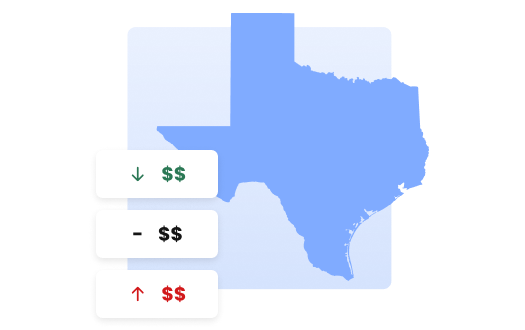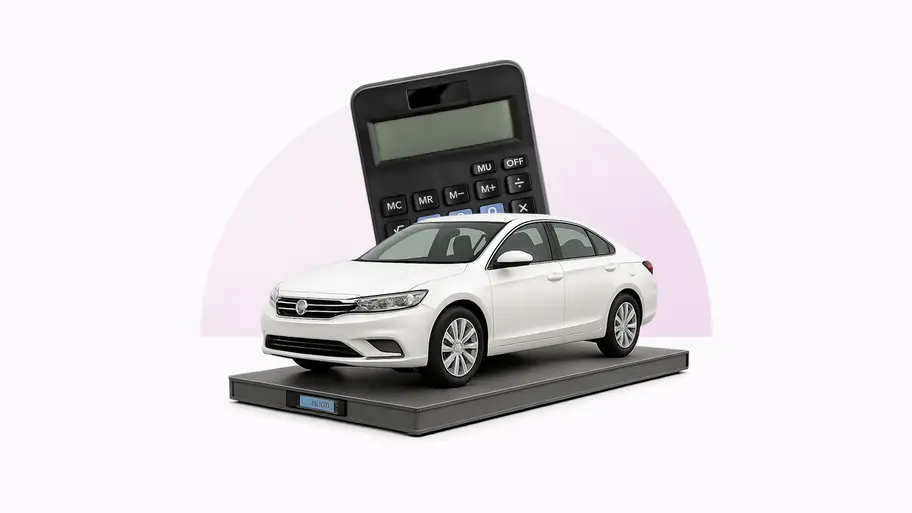Powered by Coverage.com (NPN: 19966249)
Coverage.com, LLC is a licensed insurance producer (NPN: 19966249). Coverage.com services are only available in states where it is licensed. Coverage.com may not offer insurance coverage in all states or scenarios. All insurance products are governed by the terms in the applicable insurance policy, and all related decisions (such as approval for coverage, premiums, commissions and fees) and policy obligations are the sole responsibility of the underwriting insurer. The information on this site does not modify any insurance policy terms in any way.
Average cost of car insurance in Texas for 2026

Powered by Coverage.com (NPN: 19966249)
Coverage.com, LLC is a licensed insurance producer (NPN: 19966249). Coverage.com services are only available in states where it is licensed. Coverage.com may not offer insurance coverage in all states or scenarios. All insurance products are governed by the terms in the applicable insurance policy, and all related decisions (such as approval for coverage, premiums, commissions and fees) and policy obligations are the sole responsibility of the underwriting insurer. The information on this site does not modify any insurance policy terms in any way.
Key takeaways
- Drivers in the Lone Star State pay $2,751 annually for full coverage car insurance and $786 per year for minimum coverage.
- Full coverage auto insurance in Texas costs 2 percent more than the average cost of car insurance nationwide.
- In Texas, 18-year-old drivers on their own insurance policy pay $7,325 per year for full coverage, higher than drivers in all other age groups.
- Drivers with one DUI pay 67 percent more than Texas drivers who are incident-free.
Texas car insurance rates by city
Average insurance rates vary depending on the risk (how likely you are to file a claim) associated with where you live. Beyond state-specific criteria like weather or minimum coverage requirements, insurance rates vary by city based on other factors such as traffic density and theft rates.
Sorry, we don't have enough data yet on this city yet!
But these other cities in the state may give you some insight.
| City | Avg. monthly full coverage premium | Avg. annual full coverage premium | Avg. savings vs. state average |
|---|---|---|---|
| Detroit | $214 | $2,569 | -7% |
| Henderson | $223 | $2,680 | -3% |
| Mount Enterprise | $220 | $2,636 | -4% |
| Ore City | $224 | $2,690 | -2% |
| Tatum | $229 | $2,751 | -0% |
Powered by Coverage.com (NPN: 19966249)
Coverage.com, LLC is a licensed insurance producer (NPN: 19966249). Coverage.com services are only available in states where it is licensed. Coverage.com may not offer insurance coverage in all states or scenarios. All insurance products are governed by the terms in the applicable insurance policy, and all related decisions (such as approval for coverage, premiums, commissions and fees) and policy obligations are the sole responsibility of the underwriting insurer. The information on this site does not modify any insurance policy terms in any way.

Compare auto insurance rates
Powered by Coverage.com (NPN: 19966249)
Coverage.com, LLC is a licensed insurance producer (NPN: 19966249). Coverage.com services are only available in states where it is licensed. Coverage.com may not offer insurance coverage in all states or scenarios. All insurance products are governed by the terms in the applicable insurance policy, and all related decisions (such as approval for coverage, premiums, commissions and fees) and policy obligations are the sole responsibility of the underwriting insurer. The information on this site does not modify any insurance policy terms in any way.
Average car insurance costs by age and gender in Texas
Texas car insurance rates vary by age and gender, with younger male drivers typically paying the most. As new drivers gain driving experience, rates go down, and male and female rights align.
|
|
|
|
|---|---|---|
|
Age 16*
|
$455
|
$5,458
|
|
Age 18
|
$637
|
$7,649
|
|
Age 20
|
$512
|
$6,145
|
|
Age 25
|
$312
|
$3,739
|
|
Age 30
|
$254
|
$3,048
|
|
Age 40
|
$233
|
$2,794
|
|
Age 50
|
$218
|
$2,617
|
|
Age 60
|
$209
|
$2,511
|
|
Age 70
|
$228
|
$2,733
|
|
|
|
|
|---|---|---|
|
Age 16*
|
$423
|
$5,079
|
|
Age 18
|
$583
|
$7,001
|
|
Age 20
|
$458
|
$5,491
|
|
Age 25
|
$291
|
$3,489
|
|
Age 30
|
$242
|
$2,905
|
|
Age 40
|
$226
|
$2,709
|
|
Age 50
|
$214
|
$2,568
|
|
Age 60
|
$204
|
$2,449
|
|
Age 70
|
$219
|
$2,622
|
Cost considerations for young drivers in Texas
|
|
|
|---|---|
|
Age 16*
|
$5,269
|
|
Age 17
|
$4,870
|
|
Age 18
|
$4,484
|
|
Age 19
|
$4,160
|
|
Age 20
|
$3,951
|
|
|
|
|---|---|
|
Age 18
|
$7,325
|
|
Age 19
|
$6,388
|
|
Age 20
|
$5,818
|
| Age | Avg. annual premium difference for drivers on their own policy |
|---|---|
| Age 18 | 64 percent more |
| Age 19 | 54 percent more |
| Age 20 | 48 percent more |
How does driving record impact the cost of car insurance in Texas?
Your driving record is one of the most significant rating factors for auto insurance. Drivers with accidents or moving violations on their driving record typically pay much higher rates than drivers who remain incident-free. Along with higher rates, drivers with DUIs may also need an SR-22 form (additional proof of financial responsibility) completed by their agent, which isn’t available with every carrier.
Car insurance rates in Texas by credit score
Insurers in the state of Texas use information contained in your credit report to calculate a credit-based insurance score. Drivers with poor credit may find a lower insurance rate by comparison shopping their policy with a non-standard carrier over a traditional insurance company.
Texas car insurance rates by vehicle type
From frame size to engine size to safety features, the car you choose to drive can impact your insurance costs. Auto insurance for sports cars or luxury autos can cost more to insure due to the potential cost of higher-priced claim payouts from accidents and thefts. Car insurance costs are important for drivers on the market for a new car to consider before making their purchase.
|
|
|
|---|---|
|
$229
|
|
|
$226
|
|
|
$299
|
|
|
$281
|
|
|
$237
|
|
|
$208
|
|
|
$206
|
|
|
$193
|
|
|
$284
|
|
|
$205
|
|
|
$250
|
|
|
$192
|
|
|
$240
|
|
|
$204
|
|
|
$233
|
|
|
$219
|
|
|
$208
|
|
|
$231
|
|
|
$206
|
|
|
$298
|
Estimate your car insurance cost in Texas
With car insurance rates increasing so rapidly over the past few years, it can be hard to know if you are really paying the best price possible. To help you feel confident in your current rate, Bankrate created this handy insurance calculator. After entering some basic information, you will see a rough estimate of your insurance premium. This estimate will vary from a personalized quote, but it can give you a good idea of where your rate should be.

Calculate your monthly car insurance payment
Use our free insurance calculator to estimate what you should be paying each month.
Frequently asked questions
The Bankrate Promise
Read our full methodologyAt Bankrate, we strive to help you make smarter financial decisions. While we adhere to strict , this post may contain references to products from our partners. Here's an explanation of . Our content is backed by Coverage.com LLC, a licensed entity (NPN: 19966249). For more information, please see our
78
years of industry experience
10
licensed staff
34.5K
ZIP codes examined
120
carriers reviewed
Methodology
Rates
Bankrate utilizes Quadrant Information Services to analyze November 2025 rates for all ZIP codes and carriers in all 50 states and Washington, D.C. Rates are weighted based on the population density in each geographic region. Quoted rates for our base profile are based on the following characteristics and full coverage limits with bundling and paperless billing discounts applied:

Bodily injury liability
$100,000 per person$300,000 per accident
Property damage liability
$50,000 per accidentPersonal injury protection
$100,000 per accidentUninsured motorist bodily injury
$100,000 per person$300,000 per accident
Collision deductible
$500Comprehensive deductible
$500To determine minimum coverage limits, Bankrate used minimum coverage that meets each state’s requirements. These are sample rates and should only be used for comparative purposes. Your quotes will differ.
If otherwise specified, the base profile has been modified with the following driver characteristics: